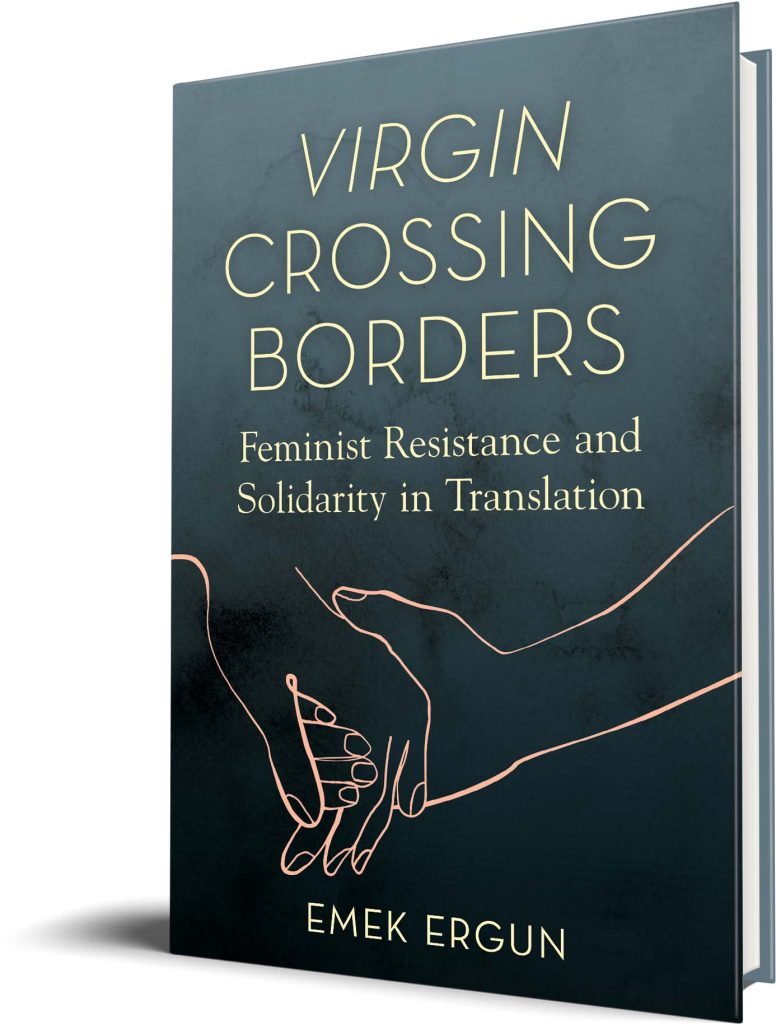Emek Ergun, author of Virgin Crossing Borders: Feminist Resistance and Solidarity in Translation, answers questions on her new book.
Q: Why did you decide to write this book?
This book, a testament to the critical role of translation in the making of transnational feminist resistances and solidarities, gradually came into existence in the course of my own transatlantic journey as a feminist, as a translator, and as a scholar who continuously crossed and dwelled at various linguistic, geopolitical, and disciplinary borders. So, I cannot really speak of a moment of decision to write this book. It was rather a process of moving across borders and becoming a transnational subject while being accompanied by feminist books, friends, teachers, and dreams, all of which made the book what it is today. All my experiences of learning to survive displacement with/in translation, writing a thesis on the medical construction of virginity in Turkey and confronting the colonial politics of knowledge production, meeting feminist historian Hanne blank and her powerful book Virgin: The Untouched History, translating it into Turkish as a politically and ethically committed project of rewriting, researching the traveling of that book between the US and Turkey in my doctoral dissertation, and gradually growing into an interdisciplinary scholar of transnational feminist studies and feminist translation studies culminated in this book.
Q: What is the most interesting discovery you made while researching and writing your book?
While researching the Turkish translation and reception of Hanne Blank’s Virgin, I worked with an amazing group of feminist readers in Turkey who taught me precious lessons on how to ethically encounter differences, connect across divisive borders, and engage in acts of feminist solidarity. They gave me hope that we can imagine and practice planetary togetherness in ways that do not pursue sameness but plurality. Thanks to those readers, I discovered the hope in translation as a form of transnational connectivity and as a tool of peaceful co-existence. Yet, while sharing those lessons with others, I also discovered how fragile and tentative that hope was. Indeed, we must work hard to keep the hope of transnational/translational feminist solidarity alive because the colonial legacies that shape our connections across borders harbor too much antagonism and violence. Virgin Crossing Borders seeks to expand that hope by sharing a feminist wisdom of translational polyphony and connectivity. That is precisely why the book highlights that we cannot accomplish transnational feminist solidarity without revisiting our cultural ethos of translation and reception. Recognizing the need for more egalitarian transnational feminist exchanges as well as the vital role of translation in enabling those exchanges, Virgin Crossing Borders seeks to invite its readers to explore the question, how can translation help us transform the antagonistic energies of borders into post-oppositional, connectionist energies that are indispensable to the formation of cross-border feminist solidarities and resistances?
Q: What myths do you hope your book will dispel or what do you hope your book will help readers unlearn?
Virgin Crossing Borders is a book about a book traveling in translation and it will hopefully change the conventional perceptions of translation as a mechanical activity by revealing the ways in which translation is a politically creative and transformative action of encountering differences and connecting across borders. Hopefully, by dismantling the common apolitical perception of translation as an invisible and secondary activity, readers will attend to the book’s invitation to reconfigure transnational feminisms as translational formations. Virgin Crossing Borders aims to bring translation from the margins to the center of contemporary thinking on transnational feminism revealing the ways in which translation contributes to the political project of feminisms by enabling retellings and exchanges of feminist theories, stories, knowledges, and affects across borders. So, the book considers translation simultaneously an interlingual, intercultural, and intersubjective art of recreation; a form of intellectual activism grounded in and in-between different political histories and social justice movements; a productive mode of negotiating difficult points of encounter across geohistorically contentious borders; and a means of transnational traveling and networking of political discourses and actors across asymmetrically positioned localities. By reconceptualizing translation as a formative, transformative, and performative force of transnational feminist politics, Virgin Crossing Borders helps readers reenvision the crucial, yet largely ignored role that translation plays in the operations of border crossing and coalition building. Second, Virgin Crossing Borders seeks to help dispel orientalist myths about “Middle Eastern women” that circulate too easily in Anglo-American terrains. By revealing the resistant stories of a group of feminists situated in Turkey, whose reading practices provide us with crucial lessons on how to build transnational solidarities, the book illustrates how ethically accountable and politically empowering translational feminist connectivities can be established along the colonial fault lines of the “west vs east” order. In short, the book will hopefully help its readers unlearn their deep-seated colonial meaning making habits in their encounters with the narratives, voices, and agencies of “Third World women” traveling in translation.
Q: Which part of the publishing process did you find the most interesting?
Reworking the text so that it engaged more actively with the other publications in the “Transformations: Womanist, Feminist, and Indigenous Studies” series made the publishing process very interesting to me. The series editor AnaLouise Keating had already been such an inspirational voice in my work that preparing the manuscript so that it would talk to her work (and Gloria Anzaldúa’s) more substantially helped me explore the politics of post-oppositionality directly in my book. Moreover, reworking my manuscript for a series that had just published Richa Nagar’s Hungry Translations made the editing process so much more exciting. These brilliant scholars’ works offered new analytical insights for my work and I am very thankful that my book now has the opportunity to share the same critical space with them.
Q: What is your advice to scholars/authors who want to take on a similar project?
Breaking disciplinary ties and confines and engaging in interdisciplinary work is my biggest advice to scholars. Interdisciplinary work can be daunting and disorienting but it is through interdisciplinarity that I found the remarkable perspectives of feminist translation studies, traveling theory, reception theory, and post-oppositionality. When brought together, these theoretical and methodological tools helped me gain analytical insights that I wouldn’t have reached otherwise. Breaking and blurring disciplinary boundaries (and hence academic conventions) help us expand our epistemic visions and that is precisely why I believe in the bigger disruptive potential of knowledge produced in interdisciplinary frameworks.
Q: What do you like to read/watch/or listen to for fun?
I love reading fiction, especially feminist science fiction. Octavia E. Butler’s novels, Audre Lorde’s poetry, Tracy Chapman’s music are among some of my all-time favorites. I am currently reading Pip Williams’ novel, The Dictionary of Lost Words about the power of words and Zapatista Stories for Dreaming an-Other World written by Subcomandante Marcos and translated by the Lightening Collective.

Emek Ergun is an associate professor of women’s and gender studies and global studies at the University of North Carolina at Charlotte. She is the coeditor of Feminist Translation Studies: Local and Transnational Perspectives and Feminist Theory Reader: Local and Global Perspectives, fifth edition.

